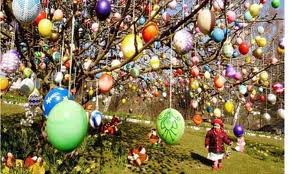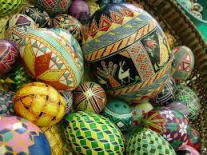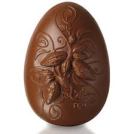Tuned in: Enya, Tempus Vernum (Springtime) 
Easter is the Christian holy day celebrating the resurrection of Jesus Christ. However, many traditions related to this day come from ancient practices.
It is believed that when ‘second century A.D. missionaries seeking to convert the tribes of Northern Europe’ observed the day commemorating the resurrection of Jesus, they noticed that it coincided with Teutonic springtime celebrations, which ’emphasized the triumph of life over death.’ Christianized tribes absorbed these springtime traditions and their symbols.
Easter takes its name from several sources. One is from the Saxon goddess known as Oestre or Eastre. The Germans called her Ostara. She is the goddess of fertility, dawn and spring. She is “the shining light arising from the east.” A more ancient source is the Chaldean deity, Ishtar. She is the Babylonian goddess of “fertility, love, war and sex.”
Some biblical scholars cite that the term “Easter” was a mistranslation in the King James Version Bible of the Greek ‘Pasch or Passover.’ Most other translations, including the New King James Version use ‘Passover.’ Some translations like Douay-Rheims use ‘Pasch.’
‘3 And because he [Herod] saw it pleased the Jews, he proceeded further to take Peter also. (Then were the days of unleavened bread.) 4 And when he had apprehended him, he put him in prison, and delivered him to four quaternions of soldiers to keep him; intending after Easter to bring him forth to the people.’ (King James Version-1610) Acts 12: 3,4
‘3 When he [Herod] saw that this met with approval among the Jews, he proceeded to seize Peter also. This happened during the Festival of Unleavened Bread. 4 After arresting him, he put him in prison, handing him over to be guarded by four squads of four soldiers each. Herod intended to bring him out for public trial after the Passover.’ (New International Version) Acts 12:3,4
It is interesting to note that Easter is known in other languages as ‘French-Paques; Italian-Pasqua; Spanish-Pascua; Dutch-Pasen, which bears a similarity to ‘Pasch or Passover.’
Many religious and secular traditions, symbols and practices are fusions of time, cultures and beliefs. One of the Easter traditions that originates from the birth of spring and the idea of new life is the Easter egg. Here are a few fun facts surrounding this pretty egg.
In ancient times, eggs, the symbol of fertility, were painted brightly during spring festivals, especially during the festival of Ostara. The word ‘estrogen’ (female hormone) comes from the name Ostara, or Eastre.
In Medieval times, eggs were abstained from during lent. Eggs laid during this time were usually boiled and were the main staple of the Easter meal.
Eastern Orthodox Christians dye their Easter eggs red and green for the blood of the ‘sacrificed Christ’ and to celebrate the emergence of new growth from the long winter.
Some of the more decorative egg practices come from Eastern Europe. Eggs were painted silver and gold. Some eggs were decorated with wax then dyed. Then wax was reapplied to preserve the second color, and then boiled in another shade. The result was a multi-patterned egg.
Eggs were used in rituals to ensure a woman’s ability to bear children. In Appalachia, midwives and healers today will try to predict the gender of an unborn child by suspending an egg on a string over a pregnant woman’s belly.
The ancient belief that when we ate something we absorbed some of the characteristics of this food may be the ‘basis for the earliest “blessings’ before meals.’ We honor the food that gives us life. The birth and life cycle connection to the egg, the rebirth of the earth at springtime, and the sacrifice of Jesus Christ celebrated in the communion although separate, in a way are metaphorically connected.
Springtime, celebrations of faith and renewal are all good ways to invigorate ourselves and feel reborn, whether it be through what we eat, believe or practice. Even though, I enjoy a great egg dish, or coloring Easter eggs. I truly love a Godiva chocolate egg!



Thank you again for a very informative story. How much fun to know why we do our Easter customs and where the word came from. We dyed our eggs deep red for the blood of Christ and poured the dye over our flower bushes in the yard. Happy Easter! Anita
LikeLike
Thanks, Anita for sharing your customs. It’s amazing how diverse these traditions are world-wide.
LikeLike
I really like the fun facts about the Easter Eggs! I wonder how long they would have to hold an egg by a string over a woman’s belly to tell?
It also got me thinking about how the Easter egg hunt originated. Do you happen to know ?
LikeLike
Thanks, Cindy. I never made the connection between estrogen and Easter!
Janet
LikeLike
Easter is a time I thank Our Lord for the sacrifice He made. Besides prayer and fasting, rather than giving something “up” during Lent, I like to “do” something I usually find a challenge or that requires a sacrifice. Cooking is my way of showing my love and gratitude for my heritage, my family and my many blessings. Although much of the year is spent paying homage to my Italian heritage through food, Easter has traditionally been a time to celebrate the food of my father’s ancestry – Armenian and Assyrian. For some reason I am reminded that Christ also came from the Middle East as my grandparents did and it seems fitting to prepare those types of recipes. We color the Easter eggs by boiling with layers and layers of yellow onion skins – the result is a deep burnished rust color -lovely. I have also colored them a deep red with red food coloring/dye – beautiful!! On another note, I was a guest at the home of Jewish friends and participated in a mock Seder in honor of Passover. It was wonderful! We may pray and celebrate in unique ways yet were reminded of our connections.
LikeLike
It seems folklore indicates that egg hunts came from the time in Europe when the rise of Christianity led to the persecution of the old ways or religions. ‘Instead of giving eggs as gifts the adults made a game of hiding them’ for the children to find. Sources state that the authorities looking for nonbelievers would bribe the children to tell where they found their eggs and thus the property owner would be apprehended.
LikeLike
I saw your questionon another blog and thought I would just say “good tags will bring you readers that like similar topics.” That is why tags are useful. All the best, -OM
LikeLike